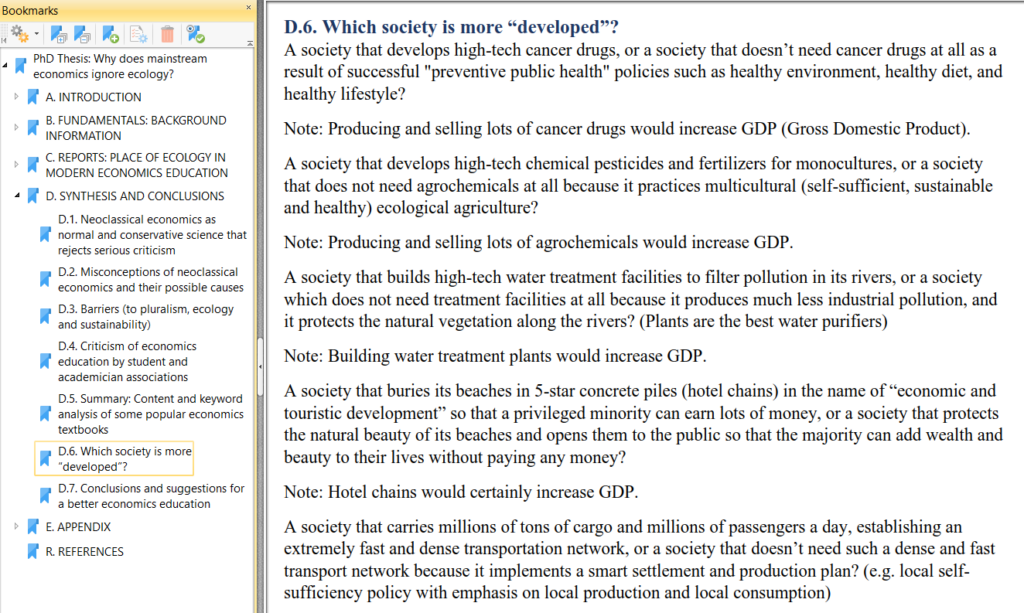
After many years of reading and research, sometimes more sometimes less intensive since 2013, including my PhD thesis in economy & ecology (2018-2021), I can summarize basic requirements of the transition from “exploitative GDP growth economy” to “sustainable wellbeing economy for all” (including future generations) in eleven bullet points.
Comments, critiques and suggestions are welcome if you have different opinions (see contact).
- GDP degrowth economy instead of GDP growth economy (see Less Is More by Jason Hickel for more information)
- Stopping military & industrial arms races (e.g. industrial fishing/agriculture/healthcare); I don’t believe, any serious social or ecological problem of humanity (including climate crisis and pandemics like covid-19) can be solved without stopping these destructive arms races that push economies toward centralisation, exploitation and destruction.
- Decentralization (localization) of economy; increasing local self-sufficiency in every aspect of life (e.g. food, shelter, health, recreation)
- Rethinking Economics & Development: End of mainstream (neoclassical/neoliberal) economics; its ideology of progress & development, technology fetishism and consumption culture
- Ecological lifestyle & education (philosophy, ecology, music, literature, fine arts, science, learning by doing & experiencing) instead of industrial lifestyle & education (Western ideology of progress, consumption culture and techno-science) that typically produce narrow-minded and tamed technicians for the corporate and state bureaucracy, who don’t ask inconvenient questions like “what am I working for, what is the meaning of my work, what is the ultimate purpose?” (see the case of Adolf Eichmann, the evil of mediocrity – Hannah Arendt)
- Protecting nature & bio-diversity along with the rights of indigenous societies
- Focusing on fundamental human needs like healthy environment, food & water; reducing wasteful and harmful consumption
- Stopping parasitic earnings that steal wealth from local communities and future generations (see Ecosystem Mutilation & Patching Business)
- Reclaiming the commons and Rewilding
- Transition from unsustainable & unhealthy industrial farming based on unsustainable monocultures (e.g. wheat, maize, rice, soybean, cotton, potato), GMOs, chemical fertilizers and pesticides to ecological farming based on sustainable & healthy polycultures
- Transition from fossil and nuclear energy to renewable energy (e.g. solar, wind) in parallel to GDP degrowth economy that reduce waste and consumption
Written by Tunç Ali Kütükçüoğlu, 26 March 2021
Some selected pictures of relevant sections from my PhD thesis (why does mainstream economics ignore ecology?):













Another bullet point that should actually be added to the top of the list:
12) Local and global democratic organisations for social, environmental and economic justice that can overcome the power of big money.
It is essential to have some knowledge in human history, ecology, philosophy and political economy to differentiate real/honest Green Transformation (aiming sustainable wellbeing for all) from Green Washing and image polishing (aiming stable or more profit for Big Money).
This means, an average graduate of modern industrial education, which is typically poor in holistic thinking, philosophy, ecology and human history, can easily be deceived by the Green Washing propaganda of business and state (e.g. technological fixes, Green Growth, Green Capitalism).
Two important authors about the necessary social transformation:
1) Erich Fromm (1900-1980), “Haben oder Sein” (book: to have or to be); away from the superficial, money & market oriented consumption culture
Erich Fromm – Gespräch zu “Haben oder Sein” (youtube)
https://www.youtube.com/watch?v=L_2mn39AU0c
2) Christopher Lasch (1932-1994) with his books like “The Culture of Narcissism”, “The True and Only Heaven: Progress and its critics” and “The Revolt of the Elites”
A magnificent audiobook that I hear again and again:
The Revolt of the Elites (youtube)
https://www.youtube.com/watch?v=SQ_B1VPWniI
An excerpt from my PhD thesis that can be downloaded here:
Why does the theory & education of mainstream (neoclassical) economics ignore ecology? (pdf download)
https://www.mediafire.com/file/y455nvq3r5803sv/PhD-Thesis-Tunc_DRAFT_2021.pdf/file
Barriers to sustainable human life on earth

industrial paradigm, Western ideology of progress, narrow business interests, etc.
One of the greatest barriers to sustainable & equitable human life is the technology fetish (misinformed and misleading technology optimism) in mainstream economics that claims, economic growth (GDP growth) and technological progress can solve every (social & ecological) problem of humanity.
My tweet chain (thread) about technology fetish (10 January 2023):
https://twitter.com/tuncalik/status/1612834409232703488
In this podcast, anthropologist & economist Jason Hickel explains the social transformation that is needed for sustainable & equitable human life on earth quite well.
Degrowth and Ecosocialism | Jason Hickel (youtube)
My comment to this podcast:
Vandana Shiva is my favorite among the suggested speakers at the and of this podcast. She was the prime inspiration for my PhD in economy & ecology, with the subject “why does mainstream economics ignore ecology?”. I think, Jason Hickel summarized the social transformation that is needed for sustainable & equitable human life on earth very well. Two points that might be missing were maybe (1) decentralization of economy (increasing local self-sufficiency in every aspect of human life), and (2) transition from industrial to ecological lifestyle, education & farming. Personally, I don’t believe in the “sustainable cities” rhetoric; population must be dispersed back to the countryside. You may see my blog article: What does “sustainable wellbeing economy for all” require? (summarized in 12 points). George Monbiot has an excellent formulation for (7) in the article: Private sufficiency, public luxury! (as Jason Hickel says, decreasing the commodification of basic human needs like healthcare, education and recreation)
I completely agree with the journalist George Monbiot, who says, a sustainable wellbeing economy for all is not only about a balance between business and state; there is the third sector, namely the commons. Common resources like a shared pasture or farm, are mostly about nonmonetary production of nature and local communities. In that sense, commons represent the nonmonetary (and nonmarket) side of the economy, which is often cannibalized for the sake of monetary economic growth (GDP growth).
Not capitalism, not communism; George Monbiot on why we need the commons
https://youtu.be/QUIRRp0i-3w?si=9kirIBq4DN0u6hOh
I agree with ecologist and economist Prof. William (Bill) Rees: Overshoot (planetary boundaries, ecological limits), ecological carrying capacity and over-population of humans are primary issues.
Confronting Overshoot: Changing the Story of Human Exceptionalism (youtube)
https://www.youtube.com/watch?v=3MVmkIYy9aI